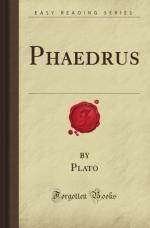|
This section contains 4,285 words (approx. 15 pages at 300 words per page) |

|
SOURCE: An introduction to The Fables of Phaedrus, translated by P. F. Widdows, University of Texas Press, 1992, pp. 11-23.
In the following essay, Widdows reviews the fabulist tradition beginning with the "semilegendary" Aesop and discusses the complex issues involved in translating Phaedrus's poetry.
Life and Works
Almost all our information about Phaedrus, the Roman fabulist of the period of Augustus and Tiberius, is derived from his work itself, some of it directly, some of it by deduction. Outside that there is only one contribution, but it is an important one. It comes from the only surviving manuscript of Phaedrus, the Codex Pithoeanus (ninth century A.D.), which entitles the collection Phaedri, Augusti liberti, fabularum aesopiarum libri [The Books of Aesopic Fables by Phaedrus, the Freedman of Augustus]. That is to say, he was a slave in the household of Augustus and at some point was granted his freedom...
|
This section contains 4,285 words (approx. 15 pages at 300 words per page) |

|


